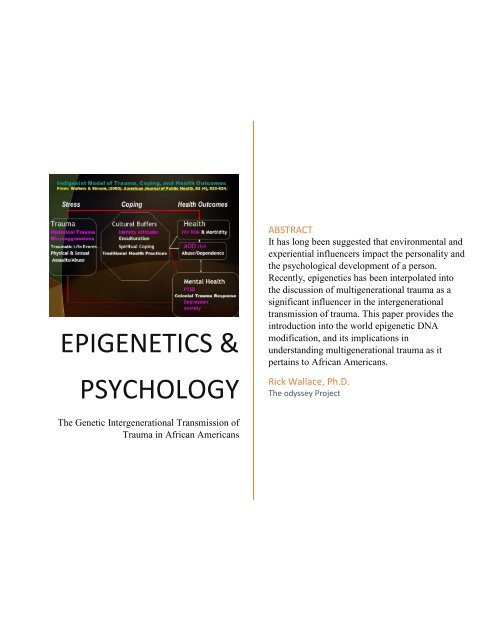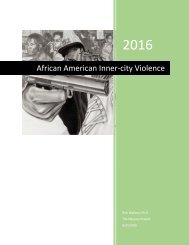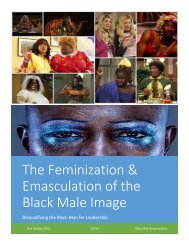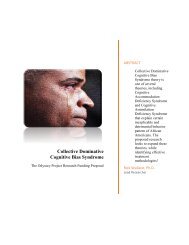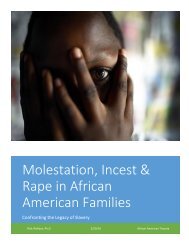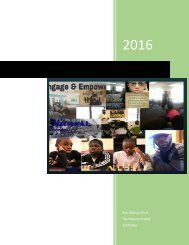Epigenetics in Psychology: The Genetic Intergenerational Transmission of Trauma in African Americans
It has long been suggested that environmental and experiential influencers impact the personality and the psychological development of a person. Recently, epigenetics has been interpolated into the discussion of multigenerational trauma as a significant influencer in the intergenerational transmission of trauma. This paper provides the introduction into the world epigenetic DNA modification, and its implications in understanding multigenerational trauma as it pertains to African Americans.
It has long been suggested that environmental and experiential influencers impact the personality and the psychological development of a person. Recently, epigenetics has been interpolated into the discussion of multigenerational trauma as a significant influencer in the intergenerational transmission of trauma. This paper provides the introduction into the world epigenetic DNA modification, and its implications in understanding multigenerational trauma as it pertains to African Americans.
You also want an ePaper? Increase the reach of your titles
YUMPU automatically turns print PDFs into web optimized ePapers that Google loves.
EPIGENETICS &<br />
PSYCHOLOGY<br />
ABSTRACT<br />
It has long been suggested that environmental and<br />
experiential <strong>in</strong>fluencers impact the personality and<br />
the psychological development <strong>of</strong> a person.<br />
Recently, epigenetics has been <strong>in</strong>terpolated <strong>in</strong>to<br />
the discussion <strong>of</strong> multigenerational trauma as a<br />
significant <strong>in</strong>fluencer <strong>in</strong> the <strong>in</strong>tergenerational<br />
transmission <strong>of</strong> trauma. This paper provides the<br />
<strong>in</strong>troduction <strong>in</strong>to the world epigenetic DNA<br />
modification, and its implications <strong>in</strong><br />
understand<strong>in</strong>g multigenerational trauma as it<br />
perta<strong>in</strong>s to <strong>African</strong> <strong>Americans</strong>.<br />
Rick Wallace, Ph.D.<br />
<strong>The</strong> odyssey Project<br />
<strong>The</strong> <strong>Genetic</strong> <strong>Intergenerational</strong> <strong>Transmission</strong> <strong>of</strong><br />
<strong>Trauma</strong> <strong>in</strong> <strong>African</strong> <strong>Americans</strong>
<strong>Epigenetics</strong> <strong>in</strong> <strong>Psychology</strong>: <strong>The</strong> <strong>Genetic</strong> <strong>Intergenerational</strong> <strong>Transmission</strong> <strong>of</strong> <strong>Trauma</strong> <strong>in</strong> <strong>African</strong><br />
<strong>Americans</strong><br />
My quest to discover the answers to some <strong>of</strong> the most enigmatic questions surround<strong>in</strong>g the<br />
current and persistent reality <strong>of</strong> <strong>African</strong> <strong>Americans</strong> has carried me on an ethereal journey <strong>of</strong><br />
discovery, fasc<strong>in</strong>ation, and frustration. Initially, it was my desire to discover why <strong>African</strong><br />
<strong>Americans</strong> could not make the necessary adjustments to their behavior that would result <strong>in</strong> the<br />
elevation <strong>of</strong> the race as a collective. I needed to know what was at the root <strong>of</strong> the behavior <strong>of</strong> the<br />
majority <strong>of</strong> <strong>African</strong> <strong>Americans</strong>, a behavior that has all but solidified our place at the bottom <strong>of</strong><br />
the socioeconomic ladder.<br />
Early <strong>in</strong> my research, I decided to exam<strong>in</strong>e the idea that cognitive biases and cognitive<br />
distortions were at the core <strong>of</strong> this counterproductive behavior; however, while cognitive biases<br />
and cognitive distortions both play a role <strong>in</strong> the perpetuation <strong>of</strong> the current reality <strong>of</strong> the <strong>African</strong><br />
American experience, it is one <strong>of</strong> the primary causes <strong>of</strong> these cognitive <strong>in</strong>terferences that has<br />
consistently placed itself at the center <strong>of</strong> my work — trauma!<br />
First <strong>of</strong> all, any time that the term trauma comes up concern<strong>in</strong>g <strong>African</strong> <strong>Americans</strong>, it tends to<br />
make a lot <strong>of</strong> people, specifically non-blacks, uncomfortable. And, when non-blacks become<br />
uncomfortable, a large number <strong>of</strong> <strong>African</strong> <strong>Americans</strong> will go out <strong>of</strong> the way to ease that<br />
discomfort, even if that means assault<strong>in</strong>g the messenger. Simply put, because <strong>of</strong> an overall<br />
cognitive breakdown that has resulted from traumatic experiences, many blacks feel the need to<br />
advocate for the comfort <strong>of</strong> Whites by demand<strong>in</strong>g political correctness and the avoidance <strong>of</strong> any<br />
discussion that will make the White collective uneasy. And for this reason, I must make myself<br />
lucidly clear <strong>in</strong> express<strong>in</strong>g that I am unapologetically black, a man <strong>of</strong> <strong>African</strong> descent, and I love<br />
my people. Right now the black race f<strong>in</strong>ds itself <strong>in</strong> last place <strong>in</strong> every measurable category <strong>of</strong><br />
human existence, <strong>in</strong>clud<strong>in</strong>g socioeconomic status, academia, political <strong>in</strong>fluence and more. <strong>The</strong>re<br />
is no time for political correctness, nor seek<strong>in</strong>g any type <strong>of</strong> harmonious relationship with those<br />
who have cont<strong>in</strong>uously sought our demise. I search for and dissem<strong>in</strong>ate truth — it is that simple!<br />
In the process <strong>of</strong> attempt<strong>in</strong>g to understand the cognitive function <strong>of</strong> <strong>African</strong> <strong>Americans</strong>, I have<br />
been consistently forced to engage the perpetual existence <strong>of</strong> trauma. Us<strong>in</strong>g the term “trauma”<br />
when address<strong>in</strong>g the black experience <strong>in</strong> America is like light<strong>in</strong>g a powder keg <strong>of</strong> emotional<br />
explosives. <strong>The</strong>re are a large number <strong>of</strong> people, both White and Black, who suggest that the fact<br />
that slavery has been abolished for more than 150 years means that it is time for blacks to forget<br />
about the atrocities associated with slavery (DeGruy, 2005). <strong>The</strong>oretically, we are six<br />
generations removed from slavery, and that would seem to some to be plenty <strong>of</strong> time to have<br />
adjusted to the freedom and liberty we were supposedly afforded upon our release. Those who<br />
make this argument, choose to rema<strong>in</strong> ignorant to the fact that the <strong>African</strong> American’s encounter<br />
with mass trauma did not stop with the end <strong>of</strong> the Civil War. In fact, for most, especially the<br />
<strong>African</strong> male, it became worse (DeGruy, 2005; Wallace R. , 2015; Yael Danieli, 1997).<br />
Dr. Joy DeGruy has done an exceptional job <strong>in</strong> expla<strong>in</strong><strong>in</strong>g nefarious and pestilential implications<br />
associated with what she calls Post <strong>Trauma</strong>tic Slave Syndrome (DeGruy, 2005); however, for<br />
1
some blacks, it is virtually impossible to apply any level <strong>of</strong> validity to her work, despite the fact<br />
that her work is respected <strong>in</strong> the fields <strong>of</strong> study <strong>of</strong> human behavior, such as psychology and<br />
sociology. This <strong>in</strong>ability to view Dr. DeGruy’s work as valid has noth<strong>in</strong>g to do with its failure to<br />
produce empirical and pragmatic evidence <strong>of</strong> a perpetual collective stress disorder among many<br />
blacks. It is primarily due to the fact that she is black. One <strong>of</strong> the symptoms <strong>of</strong> this psychosis<br />
among <strong>African</strong> <strong>Americans</strong> is to consider the academic, social, economic and political op<strong>in</strong>ions <strong>of</strong><br />
fellow <strong>African</strong> American academicians as <strong>in</strong>ferior to their white counterparts. <strong>The</strong>refore, <strong>in</strong> order<br />
for the op<strong>in</strong>ion an <strong>African</strong> American to carry weight it must be accompanied by an endorsement<br />
<strong>of</strong> their White counterparts.<br />
<strong>The</strong> truth is that there is a wealth <strong>of</strong> empirical evidence that supports the <strong>in</strong>tergenerational<br />
transmission <strong>of</strong> trauma (DeGruy, 2005; Wallace R. , 2016; Wallace & Wallace, 2010; Weaver,<br />
2015; Yael Danieli, 1997; Schmidt, Holsboer, & Re<strong>in</strong>, 2011; Kellermann, 2001; Kahane-<br />
Nissenbaum, 2011), through both, psychological and genetic expression. So, when consider<strong>in</strong>g<br />
the fact that <strong>African</strong> <strong>Americans</strong> have never been treated for the trauma associated with slavery,<br />
the <strong>in</strong>ference <strong>of</strong> genetic, psychological and philosophical transmission <strong>of</strong> trauma (Kahane-<br />
Nissenbaum, 2011) is not only reasonable, it is the responsible response. Secondly, the statistical<br />
significance 1 <strong>of</strong> the collective behavior among <strong>African</strong> <strong>Americans</strong> cannot be expla<strong>in</strong>ed away as<br />
co<strong>in</strong>cidence (DeGruy, 2005; Wallace R. , 2015).<br />
While the antisocial 2 behavior <strong>of</strong> blacks has historically been primarily studied as a pathological<br />
occurrence, I personally believe that us<strong>in</strong>g the trauma model provides a more lucid paradigm<br />
through which to exam<strong>in</strong>e the seem<strong>in</strong>gly <strong>in</strong>explicable behavior <strong>of</strong> <strong>African</strong> <strong>Americans</strong> (Wallace<br />
R. , 2016; Jr., 2010).<br />
While there are many elements that are associated with trauma-related behavior, the rapid rise <strong>of</strong><br />
epigenetics as a key <strong>in</strong>fluence <strong>in</strong> the biological/genetic transmission <strong>of</strong> trauma <strong>in</strong>trigued me.<br />
While epigenetics is not a new field <strong>of</strong> scientific study, relatively speak<strong>in</strong>g, its <strong>in</strong>fluence on the<br />
<strong>in</strong>tergenerational transmission <strong>of</strong> trauma, and the understand<strong>in</strong>g <strong>of</strong> how this transmission takes<br />
place is relatively new.<br />
<strong>Epigenetics</strong> <strong>in</strong> <strong>Psychology</strong><br />
As far back and Freud, it has been suspected that the early experiences <strong>in</strong> life have the potential<br />
to exert immensely pr<strong>of</strong>ound and long-last<strong>in</strong>g <strong>in</strong>fluence on mental and physical health<br />
throughout the course <strong>of</strong> life. However, the manner <strong>in</strong> which this dynamic <strong>of</strong> environmental<br />
<strong>in</strong>fluence takes place has rema<strong>in</strong>ed a mystery for the most part — at least until recently. 3 In an<br />
effort to identify the primary causes <strong>of</strong> environmental <strong>in</strong>fluence on the physical and mental<br />
1<br />
Statistical significance is a term used <strong>in</strong> scientific research to expla<strong>in</strong> a situational phenomenon <strong>in</strong> which the<br />
prevalence is so great that it cannot be considered co<strong>in</strong>cidental.<br />
2<br />
In behavioral science the term “antisocial” refers to behavior that is not conducive to the prosperity, advancement<br />
and stability <strong>of</strong> a particular group. So, when this term is used <strong>in</strong> the discussion <strong>of</strong> <strong>African</strong> American behavior, it<br />
refers to behavior that is counterproductive for <strong>African</strong> <strong>Americans</strong> <strong>in</strong> general.<br />
3<br />
Approximately, a little over two decades ago, the study <strong>of</strong> <strong>in</strong>tergenerational trauma <strong>in</strong> first, second and third<br />
generation Jewish Holocaust survivors exam<strong>in</strong>e genetic <strong>in</strong>fluence, and variations <strong>in</strong> gene expression was found to<br />
play a role <strong>in</strong> this transmission.<br />
2
health <strong>of</strong> <strong>in</strong>dividuals has been most efficaciously assisted through the study <strong>of</strong> the epigenome —<br />
a layer <strong>of</strong> genetic <strong>in</strong>formation associated with deoxyribonucleic acid (DNA) that varies between<br />
<strong>in</strong>dividuals, and hav<strong>in</strong>g the capacity to be altered through various environments and experiences.<br />
Researchers are now referr<strong>in</strong>g to the epigenome as the “miss<strong>in</strong>g piece” to the etiological puzzle<br />
that expla<strong>in</strong>s the process <strong>in</strong> which environment and certa<strong>in</strong> experience directly <strong>in</strong>fluence the<br />
development <strong>of</strong> certa<strong>in</strong> psychological disorders.<br />
In order to develop a lucid perspicacity <strong>of</strong> the manner <strong>in</strong> which biology plays a role <strong>in</strong> learn<strong>in</strong>g,<br />
memory, social behavior and emotion <strong>in</strong> humans, it will be necessary to first understand the<br />
mechanisms <strong>in</strong> the <strong>in</strong>itiation, ma<strong>in</strong>tenance and heritability <strong>of</strong> epigenetic states.<br />
What we know, to this po<strong>in</strong>t, is that epigenetics <strong>in</strong>fluence mental health, behavior and physical<br />
health <strong>in</strong> at least two ways — progressive genetic variation 4 and <strong>in</strong>tergenerational transmission. 5<br />
When consider<strong>in</strong>g the dynamics <strong>of</strong> epigenetics, it will be important to understand the <strong>in</strong>extricable<br />
connection between m<strong>in</strong>d and body, as expressed <strong>in</strong> psychosomatics. It is impossible to have any<br />
significant changes <strong>in</strong> m<strong>in</strong>d function, without a correspond<strong>in</strong>g change <strong>in</strong> biological function, and<br />
vice versa.<br />
Additionally, epigenetics <strong>in</strong> the world <strong>of</strong> psychology creates the framework through which we<br />
are able to ga<strong>in</strong> an understand<strong>in</strong>g <strong>of</strong> how gene expression is <strong>in</strong>fluenced by <strong>in</strong>dividual experience<br />
and the environment <strong>in</strong> a manner that produces an <strong>in</strong>dividual difference <strong>in</strong> cognition, behavior,<br />
personality and mental health. While there are some challenges to us<strong>in</strong>g certa<strong>in</strong> epigenetic<br />
approaches <strong>in</strong> psychology, there is def<strong>in</strong>itely more promise, especially for those <strong>of</strong> us, <strong>in</strong>clud<strong>in</strong>g<br />
myself, who prefer to use a trauma model (<strong>in</strong> lieu <strong>of</strong> a pathological model) to study antisocial<br />
behavior <strong>in</strong> <strong>African</strong> <strong>Americans</strong>. It is my postulation that, with the exception <strong>of</strong> a small<br />
percentage <strong>of</strong> cases, even behaviors that can be classified as pathological, have their orig<strong>in</strong> <strong>in</strong> the<br />
seed <strong>of</strong> the psychological and physical trauma associated with slavery, and the subsequent<br />
traumata that followed via convict leas<strong>in</strong>g, reconstruction, Jim Crow (Alexander, 2010), serial<br />
forced displacement (Fullilove & Wallace, 2011), the assault on the black family nucleus<br />
(Rhodes, 2016; Williams, 2015), mass <strong>in</strong>carceration and more.<br />
Primary Learn<strong>in</strong>g Objectives<br />
1. Def<strong>in</strong>e and expla<strong>in</strong> the term “epigenetics” as it applies to the <strong>in</strong>tergenerational<br />
transmission <strong>of</strong> trauma<br />
2. Name and briefly discuss relevant neural and developmental pathways that are regulated<br />
by epigenetic factors<br />
3. Develop an understand<strong>in</strong>g <strong>of</strong> how the mis-regulation <strong>of</strong> epigenetic mechanisms can lead<br />
to diseases states<br />
4<br />
Progressive genetic variation refers to the process <strong>of</strong> the variation <strong>in</strong> the genome based on environment and<br />
experience <strong>of</strong> an <strong>in</strong>dividual over the course <strong>of</strong> their life. This process expla<strong>in</strong>s why identical tw<strong>in</strong>s, which are<br />
genetically identical at birth, develop physical, emotional and psychological dist<strong>in</strong>ctions as they grow older.<br />
5<br />
When discuss<strong>in</strong>g epigenetics, <strong>in</strong>tergenerational transmission refers to the molecular process <strong>in</strong> which the<br />
progenitors passes on certa<strong>in</strong> epigenetic tags through the process <strong>of</strong> mitosis and meiosis dur<strong>in</strong>g conception.<br />
3
4. Recognize the manner <strong>in</strong> which epigenetic mach<strong>in</strong>ery can be targeted by therapeutic<br />
agents<br />
Def<strong>in</strong><strong>in</strong>g and Expla<strong>in</strong><strong>in</strong>g <strong>Epigenetics</strong><br />
While the significant <strong>in</strong>fluence that epigenetics has on the transmission <strong>of</strong> trauma may still be <strong>in</strong><br />
its <strong>in</strong>fancy stages, the term “epigenetics,” itself, has been around for quite some time.<br />
<strong>Epigenetics</strong> has long been used to expla<strong>in</strong> micro-variations <strong>in</strong> the genome over time. Where this<br />
has been witnessed most prevalently <strong>in</strong> humans is with identical tw<strong>in</strong>s. Because identical tw<strong>in</strong>s<br />
are genetically identical, they make good subjects when study<strong>in</strong>g how environment and<br />
experience can directly impact a person’s physical and psychological pr<strong>of</strong>ile.<br />
While epigenesis has been the focus po<strong>in</strong>t <strong>of</strong> a number <strong>of</strong> different studies surround<strong>in</strong>g<br />
progressive genetic variation, the lack <strong>of</strong> efficient technology has limited what could be detected<br />
and studied on a molecular level — until now.<br />
In the worlds <strong>of</strong> psychology and biology, epigenetics refers to the totality <strong>of</strong> all molecular control<br />
mechanisms programm<strong>in</strong>g the genome and respectively regulat<strong>in</strong>g gene activity (Schmidt,<br />
Holsboer, & Re<strong>in</strong>, 2011). Simply stated, epigenetics refers to the heritable changes <strong>in</strong> gene<br />
expression (active verses <strong>in</strong>active) that does not <strong>in</strong>volve changes to the underly<strong>in</strong>g DNA<br />
sequence, a change <strong>in</strong> phenotype without a change <strong>in</strong> genotype — subsequently impact<strong>in</strong>g how<br />
cells <strong>in</strong>terpret or read genes. <strong>The</strong> existence <strong>of</strong> epigenetic tags that can be passed down through<br />
procreation from either or both parents, or developed through certa<strong>in</strong> experiences and the<br />
exposure to certa<strong>in</strong> environments, has the capacity to turn on/<strong>of</strong>f certa<strong>in</strong> genes that control<br />
behaviors, perceptions, responses and more. In other words, epigenetic tags can turn on a gene<br />
that makes a person more susceptible to develop<strong>in</strong>g cl<strong>in</strong>ical depression. It can also be responsible<br />
for turn<strong>in</strong>g on genes that <strong>in</strong>crease the risk <strong>of</strong> develop<strong>in</strong>g cancer. So, the gene expression<br />
produced by epigenetic mutation can cause both, mental and physical health issues. Although, I<br />
will not be elaborat<strong>in</strong>g on this <strong>in</strong>-depth, it is worth mention<strong>in</strong>g that the transmission <strong>of</strong> trauma<br />
from the parent to the child epigenetically can function as a literal biological transmission <strong>of</strong><br />
trauma. Basically, through the pass<strong>in</strong>g on <strong>of</strong> certa<strong>in</strong> epigenetic tags, the child can literally<br />
experience certa<strong>in</strong> memory-related responses to trauma that their parents experienced before they<br />
were born. It can lead to unexpla<strong>in</strong>ed feel<strong>in</strong>gs <strong>of</strong> depression and hopelessness (Kahane-<br />
Nissenbaum, 2011).<br />
As with any molecular activity, epigenetic programm<strong>in</strong>g can go wrong, and it is these epigenetic<br />
defects that are reported as be<strong>in</strong>g <strong>in</strong>fluencers <strong>in</strong> the development <strong>of</strong> a variety <strong>of</strong> diseases. When it<br />
comes to epigenetic, one <strong>of</strong> the major environmental factors that have the capacity to produce<br />
epigenetic changes — constitut<strong>in</strong>g a primary pathogenetic mechanism — is stress. As far back as<br />
Abram Kard<strong>in</strong>er (Kard<strong>in</strong>er, 1941), it has been suggested that stress <strong>in</strong>duced trauma has both<br />
physiological and psychological implications. Now, through the work <strong>of</strong> researchers and cl<strong>in</strong>ical<br />
psychologists and psychiatrists, such as Bessel van Der Kolk (Kolk B. V., 2014; Kolk B. A.,<br />
2001), we now know that stress <strong>in</strong>duced mental disorders, such as Post <strong>Trauma</strong>tic Dress<br />
Disorder, is first <strong>in</strong>itiated by a physiological response to a real or perceived threat — potentially<br />
leav<strong>in</strong>g molecular scarr<strong>in</strong>g referred to as epigenetic tags.<br />
4
A wealth <strong>of</strong> empirical data exists that shows the manner <strong>in</strong> which stress <strong>in</strong> known to contribute to<br />
the pathogenesis <strong>of</strong> a variety <strong>of</strong> disorders, <strong>in</strong>clud<strong>in</strong>g the majority <strong>of</strong> psychiatric disorders, such as<br />
PTSD and depression.<br />
Progressive <strong>Genetic</strong> Variation<br />
Early childhood is an important time for children, not only <strong>in</strong> the area <strong>of</strong> physical growth, but<br />
also as it perta<strong>in</strong>s to the mental development that is directly related to the changes <strong>in</strong> physiology,<br />
anatomy and the chemistry <strong>of</strong> the nervous system that will have an immense <strong>in</strong>fluence on the<br />
mental health <strong>of</strong> the child throughout their life. It is dur<strong>in</strong>g this period that certa<strong>in</strong> cognitive<br />
functions, such as learn<strong>in</strong>g, problem solv<strong>in</strong>g, reason<strong>in</strong>g and the ability to effectively develop<br />
relationships are developed. <strong>The</strong> development <strong>of</strong> the bra<strong>in</strong> is considerably more rapid dur<strong>in</strong>g<br />
these early years, and slows as the child becomes older. This is why children who experience<br />
traumatic experiences early <strong>in</strong> life struggle to recover to become prosocial <strong>in</strong> their behavior and<br />
decision mak<strong>in</strong>g.<br />
For those who present philosophisms and enthymematic postulations that the current state <strong>of</strong><br />
<strong>African</strong> <strong>Americans</strong> is simply a result <strong>of</strong> poor decision mak<strong>in</strong>g, I would suggest the use <strong>of</strong> a more<br />
comprehensive approach to evaluat<strong>in</strong>g the situation. When one person performs an abstract act<br />
that can be considered irrational and antisocial, and the <strong>in</strong>cident can be considered and isolated<br />
one, it may be with<strong>in</strong> reason to suggest that the person simply made a poor decision. However, it<br />
would be wise, even <strong>in</strong> an isolated <strong>in</strong>cident, to attempt to discover the impetus that <strong>in</strong>fluenced the<br />
bad decision. This is how I am able to help <strong>in</strong>dividuals who are struggl<strong>in</strong>g <strong>in</strong> the area <strong>of</strong> their<br />
decision mak<strong>in</strong>g. Conversely, when the behavior and decision mak<strong>in</strong>g <strong>of</strong> a statistically<br />
significant portion <strong>of</strong> any group is collectively behav<strong>in</strong>g <strong>in</strong> an antisocial manner, and behav<strong>in</strong>g <strong>in</strong><br />
manner that is antithetical to positive advancement, then one has to consider the cause. While the<br />
counterproductive behavior <strong>of</strong> one isolated <strong>in</strong>dividual can be easily expla<strong>in</strong>ed away, the<br />
collective failure <strong>of</strong> an entire group cannot. We must be will<strong>in</strong>g to discover the causality.<br />
Bra<strong>in</strong> development dur<strong>in</strong>g the early childhood years is more rapid than at any other time <strong>in</strong> life,<br />
with more than 700 neural connections be<strong>in</strong>g created each second. It is <strong>in</strong> this developmental<br />
process that complex gene-environment <strong>in</strong>teractions serve to <strong>in</strong>crease the number <strong>of</strong> possible<br />
contacts between neurons, as adult synaptic properties and excitability is honed.<br />
<strong>The</strong> primary challenge <strong>of</strong> psychology has been the <strong>in</strong>tegration <strong>of</strong> f<strong>in</strong>d<strong>in</strong>gs from genetics and<br />
environmental factors, <strong>in</strong>clud<strong>in</strong>g social, chemical and biological, as well as the quality <strong>of</strong> <strong>in</strong>fantmother<br />
attachments, <strong>in</strong>to the study <strong>of</strong> personality and the development <strong>of</strong> certa<strong>in</strong> mental<br />
illnesses. Based on a couple <strong>of</strong> recent studies, common DNA sequence variation and rare<br />
mutations only account for one to two percent <strong>of</strong> the total risk <strong>in</strong> the <strong>in</strong>heritance <strong>of</strong> mental<br />
disorders and other personality traits (Dick, Riley, & Kendler, 2010; Gershon, Alley-Rodriguez,<br />
& Liu, 2011). Additionally, studies attempt<strong>in</strong>g to exam<strong>in</strong>e how specific mechanisms and<br />
conditions that are the result <strong>of</strong> DNA sequence variation <strong>in</strong>fluences bra<strong>in</strong> development and<br />
function are be<strong>in</strong>g confounded by highly complex cause and effect relationships (Petronis, 2010).<br />
Expla<strong>in</strong><strong>in</strong>g Epigenetic <strong>Transmission</strong><br />
5
While epigenetics is, at m<strong>in</strong>imum, dichotomous <strong>in</strong> its ability to <strong>in</strong>fluence the physiological and<br />
psychological vulnerability to mental and physical disease, its ability to be transmitted via<br />
conception is what has <strong>in</strong>trigued me the most. While genetic variations are constantly occurr<strong>in</strong>g<br />
though life based on experiential and environmental <strong>in</strong>fluencers, it is the empirical data that<br />
suggests that parents can pass genetic tags or genetic precursors on to their progeny, through<br />
procreation, has massive implications <strong>in</strong> help<strong>in</strong>g to expla<strong>in</strong> the collective behavior <strong>of</strong> <strong>African</strong><br />
<strong>Americans</strong>.<br />
But, how does this happen? With the understand<strong>in</strong>g that different life experiences and exposure<br />
to certa<strong>in</strong> environments has the potential to cause genetic variations, creat<strong>in</strong>g what are known as<br />
epigenetic tags, we have discovered that while most epigenetic tags are erased dur<strong>in</strong>g the process<br />
<strong>of</strong> mitosis and meiosis. 67 Nature, <strong>in</strong> its wonders, has provided a unique process, <strong>in</strong> meiosis,<br />
assisted by spermatogenesis <strong>in</strong> the male progenitor and the menstruation cycle <strong>of</strong> the female<br />
progenitor, that is designed to remove the exist<strong>in</strong>g epigenetic tags that are present with both<br />
parents. However, research reveals that this process can leave beh<strong>in</strong>d some tags, especially when<br />
there is an abundance <strong>of</strong> tags present <strong>in</strong>itially (Dick, Riley, & Kendler, 2010; Gershon, Alley-<br />
Rodriguez, & Liu, 2011; Schmidt, Holsboer, & Re<strong>in</strong>, 2011). It is also worth not<strong>in</strong>g that the more<br />
emphasized a tag may be based on the significance <strong>of</strong> the experience that created it, the more<br />
likely it will be passed on.<br />
Current Perspectives<br />
Currently, a considerable amount <strong>of</strong> research is underway to develop treatments that target the<br />
epigenome, and these studies will likely produced changes <strong>in</strong> the way that PTSD patients are<br />
treated. It is important to understand that the studies surround<strong>in</strong>g epigenetics are relatively new,<br />
and there is still a great deal to learn about this fasc<strong>in</strong>at<strong>in</strong>g area <strong>of</strong> science. We are still search<strong>in</strong>g<br />
for valid pro<strong>of</strong> that the epigenetic alterations that we are able to detect and measure are causal <strong>in</strong><br />
the development <strong>of</strong> phenotypic alterations after a stressful event; however, we can confirm that<br />
researchers have observed phenotypical alterations and psychological responses to psycho-active<br />
drugs.<br />
We still have questions as to how epigenetics impact cognitive function and general perception,<br />
which was one <strong>of</strong> my <strong>in</strong>itial questions when I <strong>in</strong>itiated my research more than two decades ago.<br />
While we are still explor<strong>in</strong>g the possibilities associated with understand<strong>in</strong>g DNA modification,<br />
there is a great deal <strong>of</strong> optimism associated with the idea <strong>of</strong> be<strong>in</strong>g able to execute molecular<br />
control on gene expression.<br />
6<br />
Mitosis is a process <strong>in</strong> which the body repairs and replenishes itself on a cellular level. Dur<strong>in</strong>g this process, one<br />
cell divides, produc<strong>in</strong>g two new cells that are not only identical to one another, but they both are identical to the<br />
orig<strong>in</strong>al cell that produced them.<br />
7<br />
Meiosis is a process that allows for genetic <strong>in</strong>tegration. In other words, procreation takes place when the 23<br />
chromosomes from the male spermatozoa and 23 chromosomes from the female ovum comb<strong>in</strong>e to form the 46<br />
chromosomes <strong>of</strong> a new human life.<br />
6
While we work through this process <strong>of</strong> discover<strong>in</strong>g, categoriz<strong>in</strong>g and analyz<strong>in</strong>g the function <strong>of</strong><br />
epigenetics <strong>in</strong> psychology, we can at least, admit that there is more to the behavior <strong>of</strong> the black<br />
collective than simply poor decision mak<strong>in</strong>g.<br />
By<br />
Dr. Rick Wallace, Ph.D.<br />
Other Resources by Dr. Rick Wallace <strong>in</strong>clude:<br />
<strong>The</strong> Mis-education <strong>of</strong> Black Youth <strong>in</strong> America<br />
<strong>The</strong> Invisible Father: Revers<strong>in</strong>g the Curse <strong>of</strong> a Fatherless Generation<br />
When Your House is Not a Home<br />
Renew<strong>in</strong>g Your M<strong>in</strong>d<br />
Visit <strong>The</strong> Odyssey Project Site Here<br />
<strong>The</strong> Bluepr<strong>in</strong>t 1.0<br />
Special Education Position Paper<br />
Racial <strong>Trauma</strong> & <strong>African</strong> <strong>Americans</strong><br />
Over the past 20 years, Dr. Wallace has <strong>in</strong>vested more than<br />
48,000 hours <strong>of</strong> research <strong>in</strong>to understand<strong>in</strong>g the scientific<br />
implications <strong>of</strong> white supremacy and how they have directly<br />
impacted <strong>African</strong> <strong>Americans</strong> <strong>in</strong> all n<strong>in</strong>e areas <strong>of</strong> human<br />
activity, which <strong>in</strong>clude economics, education, enterta<strong>in</strong>ment,<br />
labor, law, politics, religion, sex and war. He has spent a<br />
substantial amount <strong>of</strong> time attempt<strong>in</strong>g to answer the question<br />
<strong>of</strong> why blacks seem <strong>in</strong>capable <strong>of</strong> overcom<strong>in</strong>g the barrier <strong>of</strong><br />
racism despite the fact that the solution has been placed<br />
before them.<br />
<strong>The</strong> preponderance <strong>of</strong> the evidence that Dr. Wallace has<br />
exam<strong>in</strong>ed has provided him with a lucid perspicacity <strong>of</strong> the complex dynamic at play — a<br />
7
dynamic that <strong>in</strong>cludes psychological, sociological, economic and political oppression<br />
that is executed through multitud<strong>in</strong>ous pernicious mach<strong>in</strong>ations. He has used this<br />
<strong>in</strong>formation to develop what he calls <strong>The</strong> Black Community Empowerment Bluepr<strong>in</strong>t<br />
1.0. This bluepr<strong>in</strong>t is a comprehensive strategy that addresses every area <strong>of</strong> concern for<br />
the black collective <strong>in</strong> great detail. Dr. Wallace has also dissem<strong>in</strong>ated his f<strong>in</strong>d<strong>in</strong>gs <strong>in</strong> a<br />
number <strong>of</strong> literary works, <strong>in</strong>clud<strong>in</strong>g his latest book, <strong>The</strong> Mis-education <strong>of</strong> Black Youth <strong>in</strong><br />
America.<br />
Currently, Dr. Wallace is mov<strong>in</strong>g <strong>in</strong>to the second phase <strong>of</strong> his research, transition<strong>in</strong>g<br />
from <strong>in</strong>ductive research to deductive research for the purpose <strong>of</strong> advanc<strong>in</strong>g and<br />
<strong>in</strong>troduc<strong>in</strong>g certa<strong>in</strong> scientific theories associated with the <strong>African</strong> American experience.<br />
To this date, Dr. Wallace’s research has proven to be immensely valuable, as he develops<br />
social programs to counter external <strong>in</strong>fluences, lectures to <strong>African</strong> <strong>Americans</strong> across the<br />
nation and develops a comprehensive bluepr<strong>in</strong>t capable <strong>of</strong> facilitat<strong>in</strong>g<br />
the complete elevation and empowerment <strong>of</strong> <strong>African</strong> <strong>Americans</strong>, as well as the complete<br />
diaspora <strong>in</strong> time, but the cost <strong>of</strong> research can be quite exorbitant, especially when he is<br />
<strong>in</strong>vest<strong>in</strong>g between 55-85 hours per week.<br />
To this po<strong>in</strong>t, all fund<strong>in</strong>g has been covered by Dr. Wallace himself. He is currently<br />
seek<strong>in</strong>g research fund<strong>in</strong>g, but due to the specific focus <strong>of</strong> his research, traditional<br />
channels, such as government, academic and private grants are not an option. While he<br />
currently has a couple <strong>in</strong>terested sponsors, both <strong>of</strong> them are non-blacks, which speaks<br />
volumes. While Dr. Wallace has committed to proceed<strong>in</strong>g at all cost, the support <strong>of</strong> the<br />
community and people he is fight<strong>in</strong>g for will prove highly beneficial <strong>in</strong> multitud<strong>in</strong>ous<br />
ways.<br />
To contribute to his work through <strong>The</strong> Odyssey Project, Click here!<br />
8
Bibliography<br />
Alexander. (2010). <strong>The</strong> New Jim Crow: Mass Incarceration <strong>in</strong> the Age <strong>of</strong> Colorbl<strong>in</strong>dness. New<br />
York: <strong>The</strong> New Press.<br />
DeGruy, J. (2005). Post <strong>Trauma</strong>tic Slave Syndrome: America's Legacy <strong>of</strong> Endur<strong>in</strong>g Injury and<br />
Heal<strong>in</strong>g. Portland, OR: Uptone Press.<br />
Dick, D. M., Riley, B., & Kendler, K. (2010). Nature and Nurture <strong>in</strong> Neuropsychiatric <strong>Genetic</strong>s:<br />
Where do We Stand? Dialogues <strong>in</strong> Cl<strong>in</strong>ical Neuroscience, 7-23.<br />
Fullilove, M. T., & Wallace, R. (2011). Serial Forced Displacement <strong>in</strong> American Cities 19-1916-<br />
2010. Journal <strong>of</strong> Urban Health: Bulleton <strong>of</strong> the New York Academy <strong>of</strong> Medic<strong>in</strong>e, Vol. 88,<br />
No. 3, 381-382.<br />
Gershon, E. S., Alley-Rodriguez, N., & Liu, C. (2011). After GWAS: Search<strong>in</strong>g for <strong>Genetic</strong> Risk<br />
for Schizophrenia and Bipolar Disorder. American Journal <strong>of</strong> Psychiatry, 253-256.<br />
Jr., M. H. (2010). <strong>The</strong> Impact <strong>of</strong> Racial <strong>Trauma</strong> on <strong>African</strong> <strong>Americans</strong>. <strong>The</strong> He<strong>in</strong>z Endowments.<br />
Kahane-Nissenbaum, M. C. (2011). Explor<strong>in</strong>g <strong>Intergenerational</strong> <strong>Transmission</strong> <strong>of</strong> <strong>Trauma</strong> <strong>in</strong><br />
Third Generation Holocaust Survivors. University <strong>of</strong> Pennsylvania Scholarly Commons.<br />
Kard<strong>in</strong>er, A. (1941). <strong>The</strong> <strong>Trauma</strong>tic Neurosis <strong>of</strong> War. New York: Hoeber.<br />
Kellermann, N. P. (2001). <strong>Transmission</strong> <strong>of</strong> Holocaust <strong>Trauma</strong> - An Integrative View. Israel<br />
Journal <strong>of</strong> Psychiatry, 256-267.<br />
Kolk, B. A. (2001). Explor<strong>in</strong>g the Nature <strong>of</strong> <strong>Trauma</strong>tic Memory: Comb<strong>in</strong><strong>in</strong>g Cl<strong>in</strong>ical Knowledge<br />
with Laboratory Methods. <strong>Trauma</strong> and Cognitive Science Haworth Press, Inc.<br />
Kolk, B. V. (2014). <strong>The</strong> Body Keeps the Score. New York: Pengu<strong>in</strong> Publishers.<br />
Petronis, A. (2010). <strong>Epigenetics</strong> as a Unify<strong>in</strong>g Pr<strong>in</strong>ciple <strong>in</strong> the Aetiology <strong>of</strong> Complex Traits and<br />
Diseases. Nature, 721-727.<br />
Rhodes, H. A. (2016). <strong>The</strong> <strong>African</strong>-American Family <strong>in</strong> Crisis. Yale-New Haven Teachers<br />
Institute, 1.<br />
Schmidt, U., Holsboer, F., & Re<strong>in</strong>, T. (2011). <strong>Epigenetics</strong> Aspects <strong>of</strong> Post <strong>Trauma</strong>tic Stress<br />
Disorder. Max Planck Institute <strong>of</strong> <strong>Psychology</strong>.<br />
Wallace, R. (1988). A Synergism <strong>of</strong> Plagues, Planned Shr<strong>in</strong>kage, Contagious Hous<strong>in</strong>g<br />
Destruction, and Aids <strong>in</strong> the Bronx. New York: Environ Res.<br />
Wallace, R. (2015). <strong>The</strong> Miseducation <strong>of</strong> Black Youth <strong>in</strong> America: <strong>The</strong> F<strong>in</strong>al Move on the Grand<br />
Chessboard. Etteloc Publish<strong>in</strong>g.<br />
Wallace, R. (2016). Racial <strong>Trauma</strong> & <strong>African</strong> <strong>Americans</strong>. <strong>The</strong> Odyssey Project.<br />
9
Wallace, R., & Wallace, D. (2010). Gene Expression and Its Discontents: <strong>The</strong> Social Production<br />
<strong>of</strong> Chronic Disease. New York, NY: Spr<strong>in</strong>ger.<br />
Walter Howard Smith, J. (2010). <strong>The</strong> Impact <strong>of</strong> Racial <strong>Trauma</strong> on <strong>African</strong> <strong>Americans</strong>. <strong>The</strong> He<strong>in</strong>z<br />
Endowments.<br />
Weaver, I. (2015). <strong>Epigenetics</strong> <strong>in</strong> Pyschology. <strong>The</strong> NOBA Project.<br />
Williams, H. A. (2015). How Slavery Affeced <strong>African</strong> American Families. National Humanities<br />
Center University <strong>of</strong> North Carol<strong>in</strong>a Chapel Hill, 1.<br />
Yael Danieli, P. (1997). International Handbook <strong>of</strong> Multigenerational Legacies <strong>of</strong> <strong>Trauma</strong>. <strong>The</strong><br />
National Center for Post-traumatic Stress Disorder, 1.<br />
10


